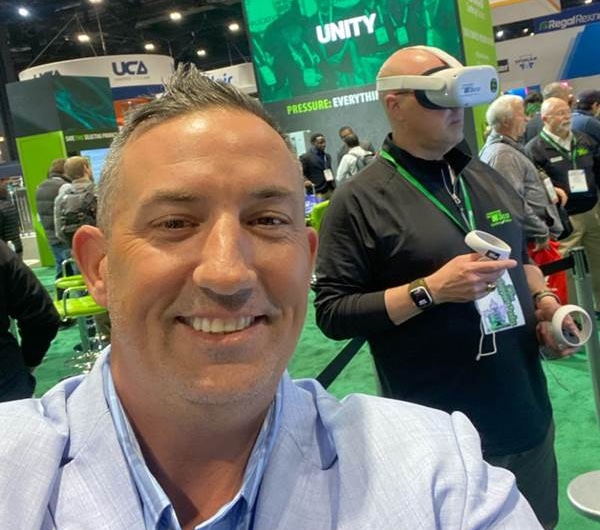Virtual and simulation training isn’t necessarily new to the industry but its acceptance has been met with intrigue, and trepidation. But to say that this is the future of training? Not so fast. The consensus thoughts regarding this type of training is that will never replace in-person or on-the-job training, but it will become a cog in the overall “wheel” for training assets.
According to Taco Comfort Solutions’ Product & Application Instructor-East, Dave Holdorf, Taco doesn’t want to change its training necessarily, rather seek to enhance the training experience.
“We ask many attendees how we can improve our classes and seminars. One of the most frequent replies is: ‘Add a hands-on section to the class; the theory is great and useful, but I want to install.’
“In a classroom setting, this can sometimes be difficult for the space needed, the time it takes, and to accommodate the different skillsets of attendees. We believe we’re now on a track with virtual reality (VR) training to give that experience to attendees—whether they’re seasoned pros, or new to the trade. VR can help to guide participants in what to look for, and more importantly what not to do on a project,” says Holdorf.

F.W. Webb’s Michael DelConte checks out the VR display at the Taco booth during the AHR Expo.
Ken Midgett, former teacher and apprenticeship Instructor, Lehigh Career & Technical Institute, now Plumbing, Marketing Director with Interplay—whose mission statement is “Better Careers Better Lives”—believes that they can play a part in a person’s career trajectory with that person using Interplay’s content. “When a person engages in learning and increases both their fundamental knowledge and the steps to do a task, we are helping that person upskill and creating more career opportunities for them. The value of a product that interplay offers is the demand function. You do not have to wait until a class is offered you can just connect and learn,” says Midgett.
Adaptation to simulation and on-demand training is paramount to success for the learner and the business. Midgett says that traditional classroom learning for skilled trades is becoming more and more challenging for several reasons:
- Finding good instructors: Many think that because they know a skill, they can teach it effectively. As a former educator, this is not always the case. This leads to poor instruction and marginal learners who are not engaged.
- The cost: The cost of running and maintaining a hands-on training center is much higher than instructor salaries and consumables.
- Change or die: Young learners are not inept at learning from lectures. Most skilled trade learners need to be engaged with learning and it must represent meaningful learning.
- The disruption of classroom learning to the workday: A rationale for going to class in the evening for 2-3 hours is losing traction to young learners. Business owners become frustrated with learning times and days as they view this as unproductive time. Young learners need to be met where they are with training that fits their lifestyle.
Interplay Learning training, combined with the new employee with the right attitude who is coachable and willing to learn, can be an explosive combination with a win-win result. “Taking an apprentice and having them spend time training and learning with on-demand training and then pushing that person into the field with a skilled person to watch and do in the real world is the best way to train this person or persons at scale,” says Midgett, who says there are numerous other advantages to this model:
- On-job efficiency increases as the apprentice now possesses the foundational knowledge and skills to perform a given task.
• Relationships are better between the journeymen and the apprentice, as the journeyman perceives the apprentice as engaged and productive.
• Business owners experience low turnover, better culture, and increased revenue as these new hires have direction and are leaning at scale.
• Technicians feel confident in their work due to training and upskilling.
• Callbacks are reduced and remediation training for the technician to increase their confidence
• Service managers can focus on coaching and maintaining technician stats instead of being the only technical lifeline for numerous techs.
• When sending these apprentices to “factory training,” they can engage and understand this much better due to the foundational knowledge.
Nonetheless, Midgett says there are a few things to note and understand about simulation and on-demand training:
• On-the-job or hands-on training with higher skilled supervision cannot be replaced.
- Simulations are great at teaching steps and muscle memory of a task.
- Simulation or any on-demand training cannot teach “feel.” As an example, simulation training cannot teach the skill of what “tight” feels like with a pair of wrenches on threaded steel piping or how tight to make a tank-to-bowl connection on a closet, or how tight a screw should be on the control board. This is what the onsite skilled person or journeyman must understand and teach effectively on site.
“While VR, AR and simulation-based technology are great resources, I do not think that any one particular learning system or style is the future,” says Rich Camacho, CEO & Co-Founder, BlueRecruit. Having said that, Camacho utilizes Interplay’s services (all of Interplay’s certifications and courses live on BlueRecruit, and when a person completes an Interplay course, they can then add that qualification to their BlueRecruit profile to strengthen their profile for Employer) and he thinks Interplay is a fantastic tool to augment in-class learning and a great launch point for someone either just entering the trades or seeking to upskill a particular technique.
“However, at the end of the day true craft mastery will occur in the field with a wrench. As technology continues to improve and costs continue to decline, Interplay will play a larger and larger part of building the next generation of skilled trades professionals and we’re excited to work alongside them in building “Better Careers and Better Lives,” says Camacho.
